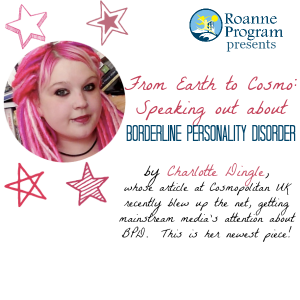From Earth to Cosmo: Speaking Out About Borderline Personality Disorder
 Please welcome guest blogger Charlotte Dingle, whose article “Living with Borderline Personality Disorder” was recently published on Cosmopolitan Magazine’s online site in the United Kingdom and shared, at press time of this article, over 12K times. Clearly, BPD is a huge topic that has long awaited attention in a mainstream media magazine. Charlotte is the young woman to exquisitely pull this off with her keen ability to resonate with young adults who suffer from this disorder. We are honored that her next article is right here with us at OPI Intensive.
Please welcome guest blogger Charlotte Dingle, whose article “Living with Borderline Personality Disorder” was recently published on Cosmopolitan Magazine’s online site in the United Kingdom and shared, at press time of this article, over 12K times. Clearly, BPD is a huge topic that has long awaited attention in a mainstream media magazine. Charlotte is the young woman to exquisitely pull this off with her keen ability to resonate with young adults who suffer from this disorder. We are honored that her next article is right here with us at OPI Intensive.
TRIGGER WARNING
I was diagnosed with Borderline Personality Disorder when I was sixteen. I’d arrived distraught at the doctor’s office, bursting through the door in an alarming hurricane of tears, smudged kohl and tangled dyed-black hair. I showed him my arms, jagged with scars from two years of desperate attacks with razorblades, cigarettes, scissors, incense sticks… anything I could get my hands on. What’s that you say? Just a typical teenage goth? Sadly not.
Fourteen years later and I’ve ditched the black hair – it’s rainbow-coloured now. I no longer cut my arms – I tattoo them now. But the BPD remains. BPD manifests as a collection of symptoms which include fear of abandonment, periods of chronic emptiness or depression, impulsive behaviour (such as overspending, substance abuse or reckless sexual behaviour) and self-harm. A nagging sense of never being good enough, of having messed everything up, is a strong characteristic. That’s probably the worst bit, in my opinion. On the plus side – quite poignantly, because most sufferers are never able to properly appreciate it in themselves – those with BPD are often highly intelligent, amusing, charming, empathic and creative.
I’m becoming a semi-successful freelance journalist and I have a good circle of friends. I feel a wreck inside a lot of the time – except on those sublime, magical high days when everything seems possible – but I get on with stuff. You can pay me to do a job and I will do it – although, like many other sufferers, I’m not a great fan of very regimented office environments. In short, I’ve learned to become fairly functioning whilst more or less remaining the mess I was as a teen inside. Well, that’s not strictly true. Since I began to learn about and understand my condition, I’ve felt better. Most importantly, since I spoke out about it, I’ve felt better. I recently wrote an article for the website of leading UK women’s lifestyle magazine Cosmopolitan. Last time I checked it had been shared 12,000 times. I’ve been overwhelmed by the response I’ve received from BPD sufferers, their friends and family and therapists who treat BPD.
Therapists who treat BPD. Sadly, they seem to be a rare breed. Since I first spoke to a doctor about my mental health issues, I’ve been shunted around the British National Health Service for 16 years, seeing therapist after therapist who either refuses to accept I have BPD or, in two cases, therapists who diagnosed me but offered an extremely bleak prognosis. BPD is widely accepted as one of the hardest psychiatric illnesses to treat. It doesn’t respond well to medication or traditional ‘talking therapy’.
So what’s to be done? I’ve heard mixed reviews of Cognitive Behaviour Therapy. I’ve heard largely – although by no means entirely – positive reviews of Dialectic Behaviour Therapy. I’d like to give these things a crack but guess what? The NHS just doesn’t seem to ‘get’ BPD. So back I go to sit and talk about my relationship with my mother, my sexual history and all the other classic psych-room discussions that just aren’t quite enough to facilitate my recovery. I can’t afford to go private – and even if I could, DBT isn’t widely practised in the UK.
I hope that in adding to the public dialogue around BPD I can help raise awareness and thus encourage medical professionals to improve the range of services they offer. Many people can and do recover from BPD – and every sufferer should have the chance to get appropriate help.
by Charlotte Dingle
Website Twitter
INTENSIVE HELP FOR BPD ► At OPI Intensive, we offer compassionate, clinically sophisticated intensive residential help for young adult men and women who suffer from borderline personality disorder or BPD traits, including genetic testing to determine the best course for medications, if needed. Rather than a sterile, hospital-like environment, we offer beautiful accommodations in luxury apartments just outside of Los Angeles. At OPI Intensive, we treat the individual, not the diagnosis. Our clinical team is made up of a diverse community of passionate, highly skilled individuals working together with you to help you find your joy and express it. For more information on OPI Intensive residential programs and our measures to help young adults with Borderline Personality Disorder, call us at 866-661-3982 or click HERE to submit an online form. We’ll be in touch promptly.
